
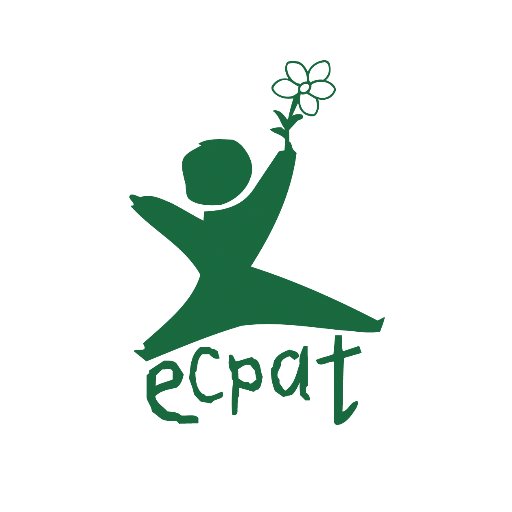
Old and new threats of child sexual exploitation in South Asia
EMBARGO – 00:00, 16 MARCH 2018, Bangkok, Thailand – ‘Ancient’ and new forms of sexual exploitation that exist ‘side-by-side’ are putting the children of South Asia at risk says a new report.
Research released this week by ECPAT International claims that the sub-continent has long been a place where the sexual exploitation of children is a serious concern, with early and forced marriage, and the trafficking of children for sexual purposes established norms in many societies. However, the report says that today, children are more prone to be victimized in both the “old and the new worlds evolving side by side.”
“All across South Asia, we have ancient brothels that have always been filled with trafficked girls,” says Rajib Haldar, ECPAT Regional Coordinator for South Asia. “What is new however, is that today these may co-exist with online child sexual exploitation, or even be contributing to this trade by promoting live streaming. At the same time, the old practice of sexually exploiting out-of-school child workers is happening today alongside the cyber bullying of school pupils. In South Asia, sexually abused child brides can live next-door to university educated girls being sexually exploited through social media.”
The report says that the online sexual exploitation of children is one of the most worrying trends in the region, and there are two kinds of online risks that are increasing for children. “On one hand, we see child sexual abuse material created, and exchanged both regionally and globally,” says Haldar. “On the other hand, we see sexual harassment and extortion of children online, mainly affecting girls. In these cases, the perpetrators are generally known to the victims, often peers or adults in the circle of trust. Sexualized images are often shared publicly on social media, and have been moving from more static platforms such as Facebook, to faster moving, more private apps such as WhatsApp, WeChat or Snapchat.”
In South Asia young people are at the forefront of Internet use. For example, in Sri Lanka, more than half of young people are online; in Bangladesh, about 85 percent of the country’s 85 million Internet users are youth; in Pakistan close to half of under 18s spend more than five hours a day online; and India has one of the highest numbers of smart phone users among young people on the planet.
“South Asian young people are gaining access to the Internet at a rapid rate via mobile phones,” says Haldar. “Free Wi-Fi hotspots often act as magnets connecting children. While this is mostly positive, it has a dark side that is increasing the risk of traditional forms of exploitation and abuse.”
The ECPAT research also points a finger at the region’s burgeoning tourism industry, warning that South Asian countries need to move quickly to better understand and counter the threat posed to children through this sector. An adverse impact of the expansion of the travel and tourism sector in South Asia is the increased threat that travelling child sex offenders pose to children. And it is not only foreigners that are a danger. Cases of domestic travelling sex offenders are also on the rise.
“South Asia needs to quickly realize that the multiplication of travel options and vacation packages may imply increasing threats for children also by local travelling child sex offenders,” says the report. “While traditional destinations for foreign child sex offenders, such as those in neighbouring Southeast Asian countries, begin to tighten up legal frameworks and create child protection mechanisms, South Asia is just beginning to acknowledge and address the sexual exploitation of children through travel and tourism.”
Although solid data is not available, previous ECPAT research suggests that the sexual exploitation of children in travel and tourism has been moving beyond traditional tourist locations and has started emerging in most of the countries in the region, especially India and Nepal.
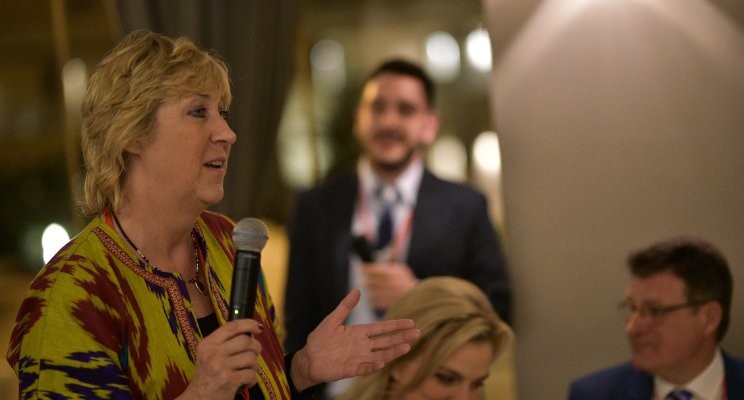
Silk Road Tourism was Alla Peressolova: UNWTO termination without explanation
Silk Road Tourism is Alla Peressolova. Alla has been the head of the UNWTO Silk Road program for 28 years. Without Alla, Silk Road Tourism wouldn’t have the brand name it has today.
At the recently-concluded ITB Berlin, the only two UNWTO events planned were connected to the Silk Road Project, and for the first time by invitation only. This included the 8th Silk Road Ministers’ Meeting, The 2025 Silk Road Tourism Agenda, and the 7th Silk Road Tour Operators Forum.
According to a reliable source within UNWTO, Alla Peressolova was very much looking forward to leading both events at ITB to conclude her UNWTO term and was then hit by a surprise when her name was not on the Berlin travel list. When trying to discuss this with UNWTO Secretary-General, Zurab Pololikashvili, he was not available to talk to her.
ITB proceeded without Alla, without her being recognized. Anna said on her LinkedIn account: “On 28 February, and after 28 years of amazing experiences, I am leaving UNWTO. Although highly excited about the new cycle that commences, I will always cherish my time here and the work accomplished within so many different areas, including Russian translation and CIS relations, communications and press, fairs strategies and the Silk Road Programme.
“Without question, the Silk Road Programme has provided me with the most rewarding years of my professional life. The continuous growth and depth of the Programme, plus the satisfaction of seeing joint actions result in tangible benefits for local Silk Road communities across our 33 Member States, has been deeply rewarding and beyond description. Because of the Silk Road I have been able to visit and explore amazing destinations and meet wonderful people – all in all, memories and friendships that have made me who I am. I am immensely grateful to my team, the true Silk Road Winners – Patrick, Elena and Nikos for their incredible professionalism, amazing enthusiasm and enormous dedication. I am sure that they will keep the Silk Road spirit healthy and alive.
“I would also like to thank all partners of the Silk Road Programme for endless support throughout these very intense years – your commitment, efficiency and spirit keeps the Silk Road Programme going. As I will definitely continue to be active within the Silk Road tourism sector, albeit in a different capacity, I would be pleased to remain connected to all of you, Alla Peressolova.”
eTN tried to get a response from the UNWTO communication team for over a week without success.
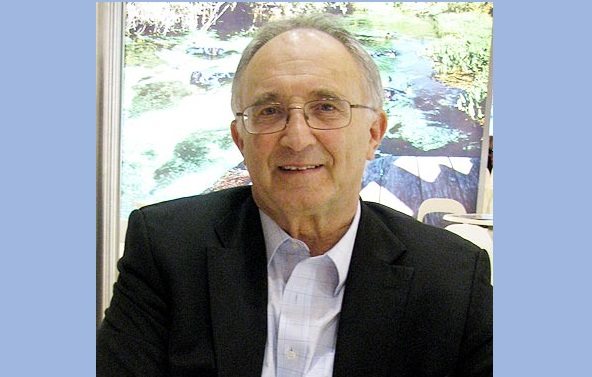
ICTP President Lipman: Take a new look at the silos of the Travel & Tourism Sector
Quoting Benjamin Franklin, at the ITB 2030 SDG Countdown Forum, Professor Geoffrey Lipman, President of the International Coalition of Tourism Partners, called for a new look at the Silos in the Travel & Tourism Sector. He congratulated ECOTRANS and its Members for 25 years of committed focus on sustainability and pledged the support of ICTP, to a closer collaboration, around the SDG’s.
Lipman also commented in his capacity as co-founder of SUNx (Strong Universal Network) – a Climate Resilience program for the sector, noting that “Unless we fix the Climate Change SDG (13) it will fix us” and lambasting the Trump Administration’s “isolated and incomprehensible retreat from for the universally agreed Paris Climate Accord”.
He concluded by reflecting on the vision of his mentor Maurice Strong, who inspired the world to embrace sustainable development over half a century, arguing that we need to focus on the eXistential nature of Climate Change. Lipman urged the broader Travel and Tourism community to bake the Paris Climate targets into every initiative “to stop our grandkids from freezing or frying”
The 2015 Paris Accords and SDGs launched, a 3-decade, low carbon transformation, recognising “Climate Change is existential”. This is the rationale for SUN x– the Strong Universal Network. Under the initial guidance of our friend and mentor, the late Maurice Strong – sustainable development pioneer, we are creating an eXchange for learning, innovation and resilience through Impact-Travel ~ measured: green: 2050 proof. With a growing cadre of graduate climate champions, supported by Maurice Strong Legacy Scholarships.
Geoffrey Lipman & Felix Dodds Co-founders.
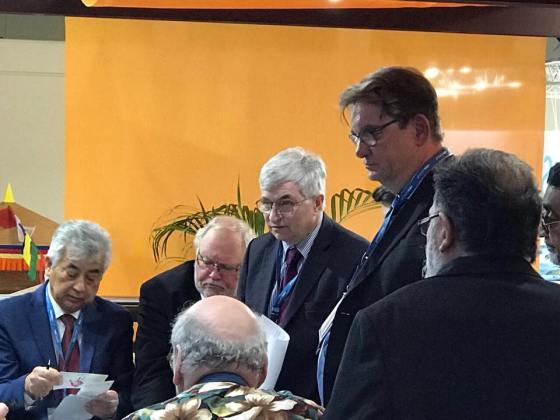
Formed at ITB: Special interest group on Child Protection Through Tourism
Many tourism stakeholders, both from the private or public sector were disappointed when the new secretary-general of the United Nations World Tourism Organization (UNWTO), Zurab Pololikashvili, canceled the annual meeting at ITB of the World Tourism Network on Child Protection. The group had met since 1995 at every ITB.
This disappointment, however, turned into a good day on Friday when it comes to child protection after all. Not only did SKAL International sign THE CODE, but the first meeting of a special interest group on child protection met at ITB Berlin today. This special interest group for child protection was formed under the umbrella of the International Coalition of Tourism Partners (ICTP).
Juergen Steinmetz, chairman of ICTP and publisher of the eTN Group of publications, is a long-time member of this group and responded to UNWTO’s cancellation in forming a special interest group on child protection. This group and those interested in child protection today met in Berlin at ITB. The event was hosted by Deepak R. Joshi, CEO of the Nepal Tourism Board, at their stand.



 Steinmetz said: “I am very pleased to see such a great response to our call for a meeting here at ITB. I would like to thank our friends at the Nepal Tourism Board for their support in hosting our meeting today and hope this will be only one of many more.
Steinmetz said: “I am very pleased to see such a great response to our call for a meeting here at ITB. I would like to thank our friends at the Nepal Tourism Board for their support in hosting our meeting today and hope this will be only one of many more.
“We will provide our own stand at the Arabian Travel Market in Dubai and IMEX in Frankfurt for the Special Interest Group on Child Protection to meet.
“I hope the new UNWTO leadership will cooperate with our effort on this important initiative. I am pleased to hear child protection will be on the agenda set by the UNWTO Secretary-General for the upcoming executive council meeting of the Americas.
“Finally, I am encouraging anyone wanting to add to our initiative or send us statements, best practices, and news on child protection to do so. It’s important for the world to stay informed and allow good initiatives to be repeated.”
Joanna Rubinstein from Childhood USA related: “There is a great momentum after the Solutions Summit to End Violence Against Children in Stockholm last month. Around 60 governments participated in the meeting that was hosted by the Swedish government and the Prime Minister and HM Queen Silvia, the founder of Childhood. Also the DSG of the UN, Amina Mohammed, joined the meeting together with the new heads of UNICEF and WHO.
“The private sector engagement in ending all forms of violence against children is crucial for the achievement of the SDGs. Therefore, using the opportunity of the ITB to meet and discussing child protection in travel and tourism is a good way to complement the other international and local efforts and to advocate for action.”
ICTP had invited UNWTO Secretary-General Zurab Pololikashvil or a representative of UNWTO to attend this meeting, but no response was received.
By becoming a member of The Code, SKAL joined industry leaders when it comes to responsible tourism. The Code (short for “The Code of Conduct for the Protection of Children from Sexual Exploitation in Travel and Tourism”) is a multi-stakeholder initiative with the mission to provide awareness, tools, and support to the tourism industry to prevent the sexual exploitation of children.




The commercial sexual exploitation of children involves the buying and selling of children under 18 years of age for sexual purposes. Sexual exploitation of children in tourism, child sex trafficking, the prostitution of children, and child pornography are all forms of this crime.
Commercial sexual exploitation of children in travel and tourism often takes place in hotels and uses other travel infrastructure. That’s why The Code believes that working with responsible tourism companies is a powerful way to keep children safe and prevent these crimes.

Celebration and Action on International Women’s Day
CALL YOUR SENATORS
On Thursday, March 8 (International Women’s Day), we need a barrage of positive calls to Senate members. Please call 202-225-3121 and you will be transferred to your Senator’s office.
Sample script for call: “My name is ___ and I live in _____ (State). I am calling to thank Senator ______ for supporting the FOSTA-SESTA package and I am calling to confirm that she/he will vote YES so that survivors and states finally will have the legal tools to hold websites accountable for knowingly facilitating human trafficking. Thank you.”
RAISE AWARENESS ON SOCIAL MEDIA — SAMPLE TWEETS AND POSTS
- As International Women’s Day approaches, let’s help @senrobportman @SenBlumenthal bring #FOSTA #SESTA, which will provide a pathway for justice for thousands of women, to the @USSenate for a vote: https://www.portman.senate.gov/public/index.cfm?p=press-releases&id=4F1678C3-3EF2-4E19-95E4-D075060BDE6D #MyFreedomDay #IWD2018 #IamJaneDoe #ListenToSurvivors
- Cheering @senrobportman @SenBlumenthal @clairecmc @SenJohnMcCain @SenatorHeitkamp @JohnCornyn & 66 co-sponsors moving #FOSTA #SESTA to Senate Floor @SenateMajLdr @chuckschumer which will benefit thousands of women. #IWD2018 #PressforProgress #IamJaneDoe #ListenToSurvivors
- Thanks @senrobportman @SenBlumenthal @clairecmc @SenJohnMcCain @SenatorHeitkamp and 66 co-sponsors moving #FOSTA #SESTA to Senate Floor @SenateMajLdr @chuckschumer which will benefit thousands of women. #IWD2018 #PressforProgress #IamJaneDoe #ListenToSurvivors #MyFreedomDay
- Please call your Senator today at 202-225-3121 to vote YES on #FOSTA #SESTA: https://vimeo.com/249095210 #ListenToSurvivors #IamJaneDoe #MyFreedomDay #IWD2018
- @SenateMajLdr @chuckschumer please bring #FOSTA #SESTA to Senate floor for a vote. It will allow thousands of victims and survivors to hold websites facilitating sex trafficking accountable. #ListenToSurvivors #IamJaneDoe #MyFreedomDay #IWD2018 https://vimeo.com/249095210
Follow and tag ECPAT-USA
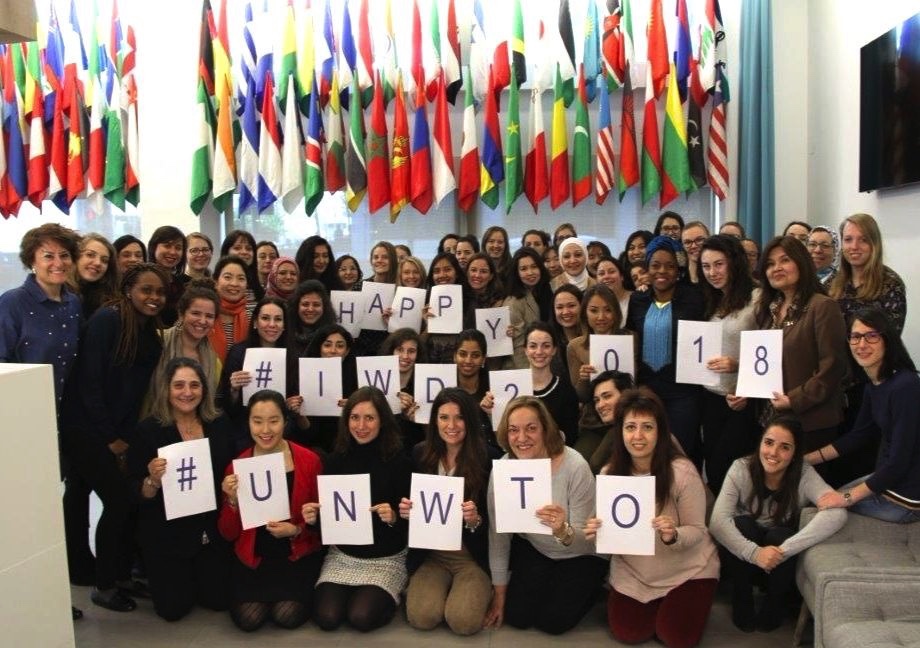
Message by UNWTO Secretary General on the occasion of International Women´s Day
Time is Now: Rural and Urban Activists Transforming Women’s Lives
Tourism can be a leading promulgator of gender equality as it offers a wide range of jobs for women, particularly in developing regions and rural areas where women still face major hardships. Indeed, there are many destinations around the world that rely upon the commitment and motivation of women working at all levels of the tourism supply chain. Yet the reality is that today women still often suffer from stereotyping and discrimination within the global tourism workforce.
As we observe this year’s International Women’s Day, it is time for the tourism sector to strengthen legal protection for women, ensure women’s equal pay and access to entrepreneurship resources, and promote women’s leadership in the tourism sector and participation in formal education.
As one of the sectors with the highest share of women both employed and as entrepreneurs, if gender equality is integrated into tourism planning and business development, we all gain. Greater gender equality impacts positively on the profitability, sustainability and overall competitiveness of the tourism sector.
Tourism can promote women’s empowerment through formal employment, which also impacts at the household and community level – contributing to the 17 universal Sustainable Development Goals, particularly Goal 5, ‘Achieve gender equality and empower all women and girls’, and other SDGs calling for inclusion and equal rights for all (Goals 1, 8, 10 and 11).
This International Women’s Day, I call upon the global tourism community to maximize every opportunity to raise awareness of gender inequality in tourism, and to help mainstream gender issues in tourism policies and strategies.
If we all work together we can realize the equal and inclusive future that we want and help to solve the world’s greatest human rights challenge: achieving true gender equality, social and economic parity between the sexes, and empowering the women that bring success not just to travel and tourism, but to world development as a whole.
Zurab Pololikashvili
Secretary-General, World Tourism Organization (UNWTO)

WTTC President & CEO talks about women leaders in tourism on International Women Day
Women in tourism is a hot subject in the travel and tourism world.
WTTC President & CEO, Gloria Guevara has been a leader in the travel industry for years – first as a female minister of tourism and now chief of the World Travel and Tourism Council. WTTC is often seen as the leading force for the private tourism world, with 100 of the largest global travel companies as members.
The following is the interview with Gloria Guevara for the International Women Day.
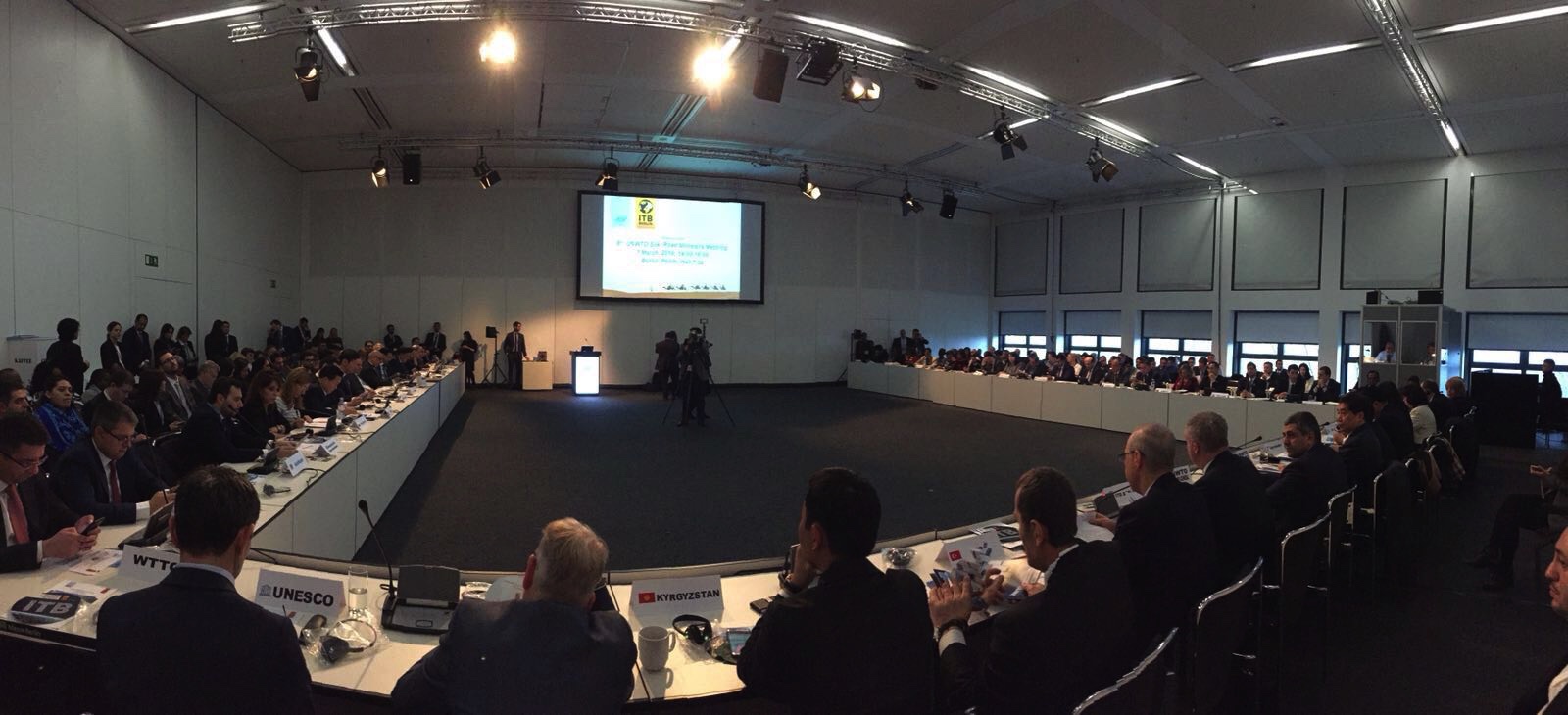
Silk Road: The Most Important Transnational Tourism Route of the 21st Century
The 8th UNWTO Silk Road Ministers’ Meeting held during the ITB Berlin Travel Trade Show, focused on the long-term tourism vision for the historic Silk Road routes and how to establish the Silk Road as the most important transnational tourism route of the 21st century.
With the theme “2025 Silk Road Tourism Agenda”; the Ministers and Heads of the National Tourism Administrations shared their main ideas and strategies, which bring together 34 countries, Malaysia having become the latest member to join this initiative spearheaded by the World Tourism Organization (UNWTO).
“Our joint work on placing the Silk Road as an internationally renowned and seamless cultural tourism route is proving to be very positive. In countries all along the Silk Road, there is growing awareness of tourism’s contribution to cultural preservation, regional cohesion, and intercultural understanding”, said UNWTO Secretary-General Zurab Pollikashvili, during the meeting. “Cross-country tourism projects are growing, and the interest of trade and consumers in the Silk Road continues to rise”, he added.
Primarily associated with inland routes, the historic Silk Road also comprised an extensive network of maritime itineraries linking various cultures. Against this backdrop, UNWTO has assessed the tourism potential of Maritime Silk Road thematic routes across Asia and took the occasion of this year’s meeting to present the research study “Tourism Impact of the 21st century Maritime Silk Road”, jointly developed with Sunny International.
UNWTO’s work around the Silk Road aims to maximize the benefits of tourism development for local Silk Road communities, while stimulating investment and promoting the conservation of the route’s natural and cultural heritage.
While Silk Road destinations stand to benefit from the persistent strong growth of international tourism, putting sustainability and trans-border cooperation first will be key to fully develop its benefits. The conclusions of the Silk Road Ministers Meeting will be further specified during the 8th UNWTO Silk Road Task Force Meeting in Turkey in April, and during the 8th UNWTO International Meeting on Silk Road Tourism in Greece in October 2018.
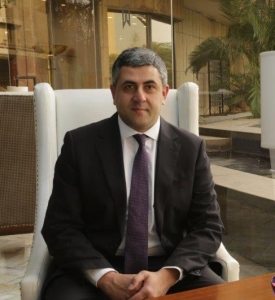
Opening Ceremony of ITB Berlin 2018:UNWTO Secretary General speaks
UNWTO Secretary General Zurab Pololikashvili last night spoke at the opening of the ITB in Berlin.
This is a transcript of his speech:
German chancellor Merkel,
Governing Mayor Müller,
Dr. Frenzel,
Dr. Goeke,
Distinguished guests,
Ladies and gentlemen,
Guten Abend.
It is an honour to be with you today.
I wish to thank ITB for its continuous contribution to the development of the tourism sector.
Ladies and gentlemen,
We gather at a time when a record number of tourists are travelling around the world.
International tourist arrivals grew by 7% in 2017, to reach 1.3 billion. This is an all-time record.
Today, 10% of the world’s GDP, 10% of the world’s jobs, and 7% of the world’s total exports come from tourism.
These are naturally very good news for our economies and our societies.
Yet, besides consolidating the growth of our sector, we need to grow better.
We need to turn these big figures into benefits to all people and all communities, leaving no one behind.
We need to decouple growth from resource use. Place Climate Change at the heart of our agenda.
We need to use the power of technology to make tourism smarter, more competitive and more responsible.
We need to make tourism a leading sector in the road to 2030 and the achievement of our common goals – the 17 Sustainable Development Goals.
Ladies and gentlemen,
I took office only two months ago.
It is with a sense of pride and humility that I assume my post as Secretary-General of the United Nations World Tourism Organization for the period 2018-2021.
Tourism’s sustained growth brings immense opportunities for economic welfare and development.
Yet, it also brings in many challenges.
Adapting our sector to the challenges of safety and security, to constant market changes, to digitalization and the limits of our natural resources should be priorities in our common action.
In this vein, I propose that we as a sector stand together to address the following priorities:
1. Education and Job creation
2. Innovation and technology
3. Safety and Security; and
4. Sustainability and Climate Change
To do so we need to:
1. Embrace a digital tourism sector
2. Adapt to new business models
3. Better manage tourism growth
Someone said there is no “overtourism, only under management”
4. Invest in education and skills development
Dear Friends
Ladies and gentlemen,
If we are to address these issues we have to strengthen public/private cooperation as well as public/public coordination.
I wish to promote what I would call a tourism alliance:
• between ministries,
• local administrations,
• private sector,
• technology partners,
• and so many others on the wide-reaching tourism value chain.
UNWTO is ready to support and work with you to make this happen.
Together we can translate tourism growth into more investment, more jobs and better livelihoods.
Together we can make tourism a sector that protects our environment, our cultures and our people.
As Chancellor Merkel said addressing the tourism industry leaders last year, “you are all development helpers”.
We count on your support and partnership and look forward to working together for a more competitive and responsible tourism sector.
Thank you.
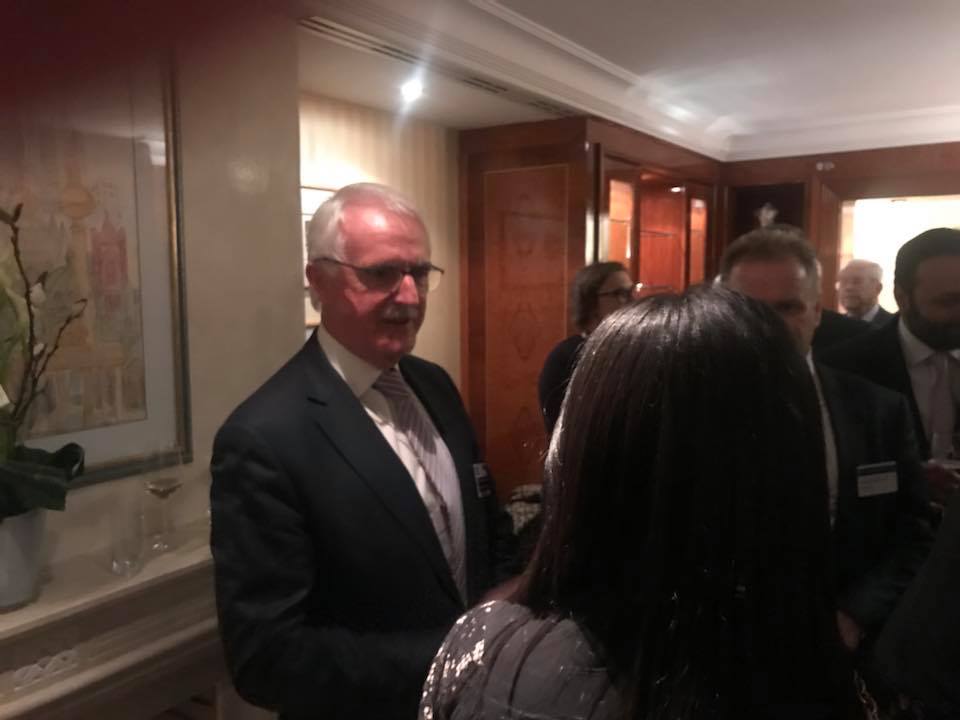
The day before ITB Berlin: IHIF and WTTC in the spotlight
The Intercontinental Hotel in Berlin was in the spotlight yesterday one day before the opening of ITB 2018 in German’s capital Berlin.
Over 80 hotel company, mostly presented by their CEO’s, attended the International Hotel Investment Forum (IHIF 2018) yesterday at the hotel. This represents the highest number of hotel company CEOs to attend the event in its 21-year history.
New topics covered in special focus breakout: F&B, Serviced Apartments, Resorts, Security & Crisis Management, Wellness, Innovative Deal Structures.
Special focus on key regional markets: Germany, Southern Europe and the Mediterranean, Asia, Middle East & Africa.
New Hotel Tech Hub: an area dedicated to teaching the industry about technology, and an opportunity for technology providers to educate the influential IHIF audience about tech products and services.
After this hotel forum, Gerald Lawless, the outgoing Chairman of the World Travel and Tourism Council was the proud host of the WTTC network cocktail and invited members to the 6th floor of the hotel to his presidential suite for a pre-ITB networking cocktail.
He thanked attending delegates for their support. After a successful term, Mr. Lawless will be replaced as Chairman at the upcoming WTTC Summit in Buenos Aires next month. Members were given an opportunity in Berlin for private fellowship and networking.
UNWTO Secretary-General Mr.Zurab Pololikashvili did not attend. He attended and spoke at the ITB Opening event hosted by German Chancellor Angela Merkel.
He spoke at the event and said:
Chancellor Merkel,
Governing Mayor Müller,
Dr. Frenzel,
Dr. Goeke,
Distinguished guests,
Ladies and gentlemen,
Guten Abend.
It is an honour to be with you today.
I wish to thank ITB for its continuous contribution to the development of the tourism sector.
Ladies and gentlemen,
We gather at a time when a record number of tourists are travelling around the world.
International tourist arrivals grew by 7% in 2017, to reach 1.3 billion. This is an all-time record.
Today, 10% of the world’s GDP, 10% of the world’s jobs, and 7% of the world’s total exports come from tourism.
These are naturally very good news for our economies and our societies.
Yet, besides consolidating the growth of our sector, we need to grow better.
We need to turn these big figures into benefits to all people and all communities, leaving no one behind.
We need to decouple growth from resource use. Place Climate Change at the heart of our agenda.
We need to use the power of technology to make tourism smarter, more competitive and more responsible.
We need to make tourism a leading sector in the road to 2030 and the achievement of our common goals – the 17 Sustainable Development Goals.
Ladies and gentlemen,
I took office only two months ago.
It is with a sense of pride and humility that I assume my post as Secretary-General of the United Nations World Tourism Organization for the period 2018-2021.
Tourism’s sustained growth brings immense opportunities for economic welfare and development.
Yet, it also brings in many challenges.
Adapting our sector to the challenges of safety and security, to constant market changes, to digitalization and the limits of our natural resources should be priorities in our common action.
In this vein, I propose that we as a sector stand together to address the following priorities:
1. Education and Job creation
2. Innovation and technology
3. Safety and Security; and
4. Sustainability and Climate Change
To do so we need to:
1. Embrace a digital tourism sector
2. Adapt to new business models
3. Better manage tourism growth
Someone said there is no “overtourism, only under management”
4. Invest in education and skills development
Dear Friends
Ladies and gentlemen,
If we are to address these issues we have to strengthen public/private cooperation as well as public/public coordination.
I wish to promote what I would call a tourism alliance:
• between ministries,
• local administrations,
• private sector,
• technology partners,
• and so many others on the wide-reaching tourism value chain.
UNWTO is ready to support and work with you to make this happen.
Together we can translate tourism growth into more investment, more jobs and better livelihoods.
Together we can make tourism a sector that protects our environment, our cultures and our people.
As Chancellor Merkel said addressing the tourism industry leaders last year, “you are all development helpers”.
We count on your support and partnership and look forward to working together for a more competitive and responsible tourism sector.
Thank you.
Anita Mendiratta brought the Hon. Rania Al-Mashat , the first female minister of tourism from Egypt to the WTTC presidential suite event. The minister posed for a photo opportunity with the outgoing WTTC chairman but did not address the audience and also leaving for the ITB opening event.
Mr. Lawless the former Group Chief Executive Officer of Jumeirah Group and now Head of Tourism and Hospitality at Dubai Holding, is a leading figure in the world of tourism and hospitality.
In his 18 years as CEO of Jumeirah Group, he spearheaded the growth of the hotel chain to one of the best-known luxury hospitality brands in the world, expanding the company’s portfolio to 22 hotels in 11 destinations and establishing Burj Al Arab Jumeirah as the most luxurious hotel in the world. Gerald has been a Member of the World Travel & Tourism Council since 2005, sitting on the Executive Committee since 2008, and as Vice Chairman since 2012.
